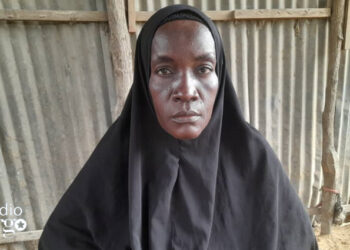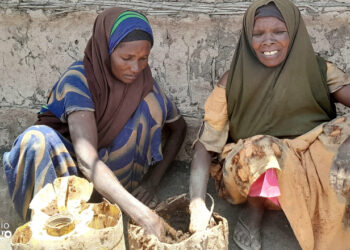(ERGO) – Abdi Dahir Shide, 48, picked up farming tools for the first time to earn a living for his family after losing his entire herd of 200 goats to the drought towards the end of last year.
He is working on a two-hectare farm in Salbay, 12 kilometres from Luq, after migrating with his family to this area close to the river Juba.
Although there has been a water shortage in the region, the farms in this area use generators to pump water from the river.
Abdi works alongside his two older sons aged 17 and 15, producing maize, beans, and other vegetables for the owner of the farm. He earns $60 a month and the boys, who do not work every day, earn $1.5-2 for the days they work.
Despite leaving his pastoralist lifestyle behind in the village 30 kilometres away, Abdi says he is getting used to the arduous work on a farm and is happy to be able to support his wife and eight children on two meals a day.
“People like us are now doing these jobs to earn a living. We are earning a living whether it’s small or big, although some days we might not earn much if there is no work to do on the farms,” he said, adding that many other people in a similar situation as his were still unemployed.
Around 500 pastoralist families displaced from other villages in Gedo after losing their livestock have also turned to farm labouring on land near the river.
Some of those with some livestock remaining have moved their animals to villages near the river, where they can access cheaper fodder for them.
Ibrahim Gedi Abdi and his family migrated to Awara village, 13 kilometres from Luq, where he was able to get water and fodder for his drought-stricken goats.
His 16 remaining animals have been recovering grazing on a farm owned by a relative, where Ibrahim is putting in work as a farm labourer to compensate.
He sold off four goats in Luq market and has been using the income to support his family of six children.
Ibrahim said they were faced with a difficult situation after losing 150 goats and 30 cows in the drought in Surtage village, 25 kilometres south of Luq.
“We arrived here because of the drought and if you look at it, we have got water and fodder and we now have livestock that we can sell in the market. The healthier goats re fetching good prices currently in the livestock market,” he said.
Most of these migrant families from pastoralist areas are living in poor shelters in villages near the river Juba. However, they are earning a living and avoiding displacement to IDP camps in the region.












